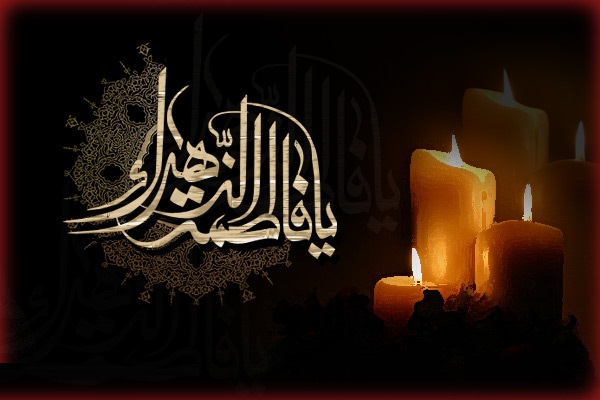A moving elegy of Fatema Zahra (S.A.) at the grave of her holy father
By: Seyyed Ali Shahbaz
“O Father! So great was the magnitude of calamities upon me after you that had they befallen bright days they would have turned into dark nights.”
The above phrase is part of a moving elegy of a daughter at the grave of her father. Although in the prime of youth, she was bent and leaning on a staff, because of severe pain in her ribs. She was lamenting the rough treatment meted out to her by a roguish group of her father’s companions, who, not just seized her patrimony and deprived her husband of his political rights, but also battered upon her the blazing door of her house, as a result of which she suffered broken ribs and miscarriage.
So grave were her sufferings that she was destined to live no more than 75 days – according to another account 95 days – after her father’s departure from the mortal world.
The identity of this aggrieved lady should be obvious by now, especially since today happens to be the 13th of Jamadi al-Awwal, a day when followers of Prophet Muhammad’s (SAWA) Ahl al-Bayt are clad in black to commemorate her tragic martyrdom.
Her mourners, wherever they might be around the world, including the Prophet’s city Medina, from where her soul flew to the ethereal heavens, have no specific spot to visualize as her shrine, since Fatema Zahra (SA) does not have a tomb.
No one knows where exactly the noblest-ever lady was laid to rest, because she did not want even the shadow of her tormentors to fall on her grave. Here is part of her Last Will to her weeping husband, the Commander of the Faithful, Imam Ali ibn Abi Taleb (AS), for whose divinely-decreed right of leadership of the ummah, she sacrificed her life: "I ask you not to let anyone who did injustice to me to witness my funeral, for they are certainly enemies of mine, and the enemies of Allah's Messenger. Don't give them the chance to pray over me, nor to any of their followers. Burry me at night when eyes are rested and sight is put to sleep."
Her words are indicative of the degree of harm she suffered at the hands of the neo Muslims, who despite their claim to be heirs of the political legacy of her father, totally disregarded the Prophet’s following statement: “Fatema is a part of me; whoever hurts her has hurt me, and whoever hurts me, has indeed displeased God.”
So, how could the lady whose spotless purity (and that of her immediate family) the Almighty Creator has vouched in the holy Qur’an (33:33), allow those who dared to incur divine wrath upon themselves in their greed for usurping what neither God nor the Prophet had willed for them, to cast their despicable shadows on her grave?
Weren’t these the same wretches who before becoming Muslims by the grace of her father had spent the greater part of their life in idol-worship and sins?
Fatema (SA), as the Siddiqat al-Kubra (the Most Truthful-Ever Lady), whose appearance by God’s commandment (holy Qur’an 3:61) on the field of Mubahela – along with the Prophet, her husband and her two young sons, Imam Hasan (AS) and Imam Husain (AS) – had convinced the Christians of Najran of the truth of Islam, was thus drawing a permanent line between truth and falsehood, so that posterity would be able to discern who actually were the repositories of Divine Truth.
The irony of Islamic history is that despite the testimony of the holy Qur’an in her favour and that of her husband and sons, as the barometers of true faith, the chief conspirator of the scandalous event of Saqifa Bani Sa’da, while battering the flaming door upon her, had threatened to burn the Ahl al-Bayt of the Prophet to death, if Imam Ali (AS) doesn’t give oath of allegiance to his candidate for the caliphate. And when the injured Fatema (SA) clung to the raiment of her husband as he was being dragged by the ruffians, with a rope around his neck, this same person had ordered his slave Qunfudh to whip the hands of the Prophet’s daughter.
Here, I would like to quote what the famous Sunni scholar Ibn Abil-Hadid Mu’tazali has said about his discourse with a fellow Sunni scholar concerning the truthfulness of the Prophet’s daughter: “I asked Ali Ibn Fareqi, a distinguished teacher of Madrassat-al-Gharbiyya of Baghdad: "Was Fatema truthful in making the claim (regarding her patrimony of the orchard of Fadak, which the Caliph had seized on the pretext that Prophets do not leave inheritance – despite the explicit words of the Qur’an that Solomon inherited David)?"
He answered: "Yes!"
I said: "Did Abu Bakr know that she was a truthful lady?"
Again he answered: "Yes."
I then asked: "Then why did the Caliph not give back to her that which she was entitled to?"
At that moment the teacher smiled and said with great dignity: "If he had accepted her word on that day and had returned Fadak to her on account of her being a truthful lady and without asking for any witnesses, she could very well use this position for the benefit of her husband on the following day by saying, “my husband, Ali is entitled to the caliphate.” And then the Caliph would have been obliged to surrender the caliphate to Ali on account of his having acknowledged her to be a truthful lady. However, in order to obviate any such claim or dispute he deprived her of her undisputed right!"
Glory to Fatema (SA) the Epitome of Truth, who gave her life to ensure the eternality of her father’s designation of her husband as vicegerent on God’s command at Ghadeer-Khom!
/129

